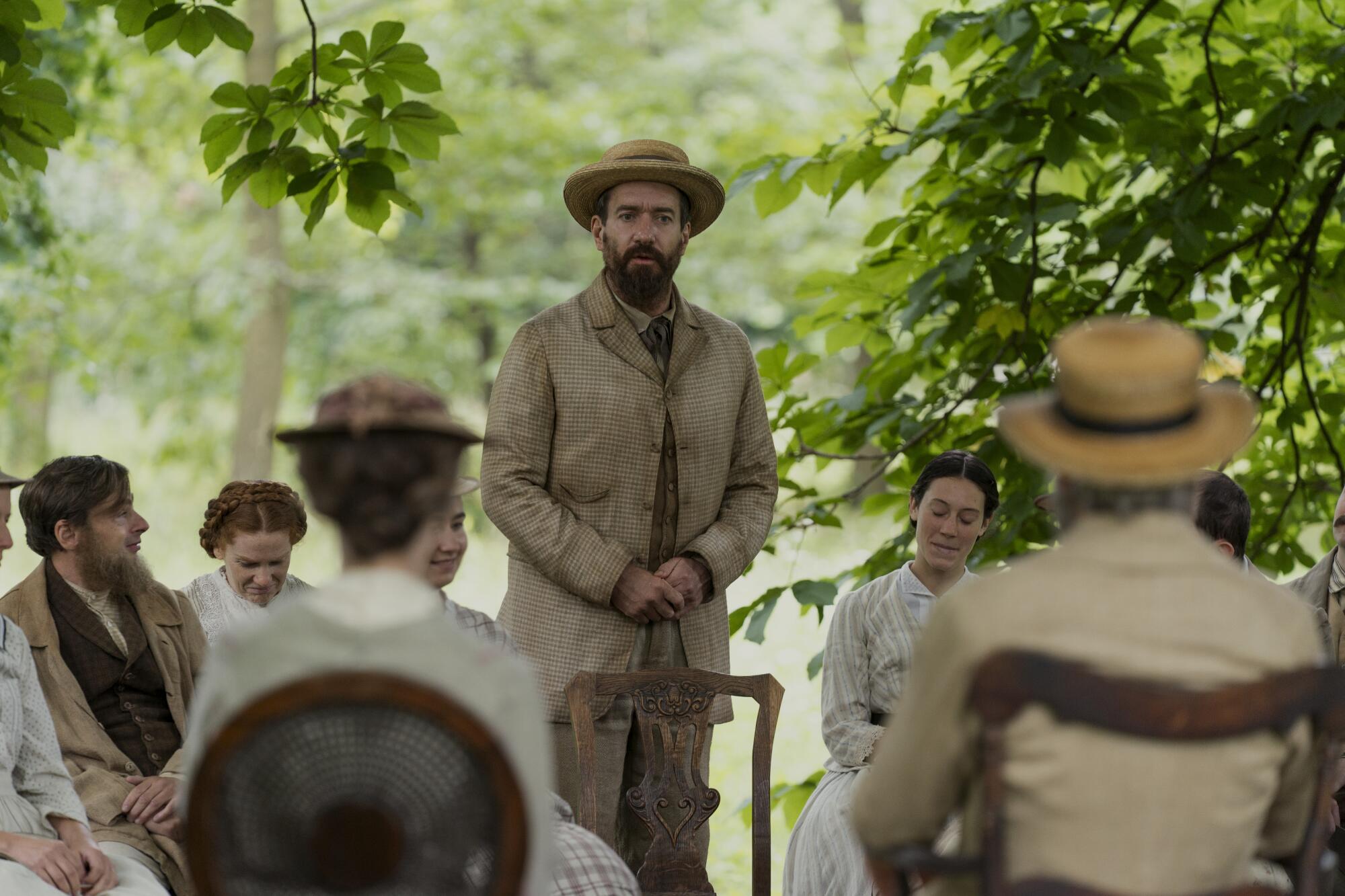‘Death by Lightning’: Who were President Garfield and Charles Guiteau?
This article contains some spoilers for the Netflix miniseries “Death by Lightning.”
If politics today make your head spin, wait until you see Netflix’s “Death by Lightning.” The four-part miniseries, premiering Thursday, chronicles one of the more jaw-dropping stretches of post-Civil War American history, when corruption ran rampant, a presidential nominee was drafted at the 11th hour, only to be assassinated early in his term by one of his biggest fans — becoming perhaps the greatest head of state we never really got to have.
And the show answers the burning expletive-laced question posed by its first line: Who is Charles Guiteau?
“I’ve been in a James Garfield rabbit hole for seven years of my life at this point,” says showrunner Mike Makowsky, who adapted Candice Millard’s 2011 chronicle of Garfield and Guiteau, “Destiny of the Republic.” Those who paid attention in history class probably remember that Garfield served briefly as our 20th president in 1881 before being shot and killed. Those who remember more than that are few and far between.
“My own agent half the time refers to him as Andrew Garfield,” says Makowsky. “And I have to confess, I knew very little about Garfield, like most Americans, until I picked up Candice Millard’s remarkable book.”
Realizing he knew little about one of the four American presidents to be assassinated, Makowsky thought, “Since I would desperately like to be on ‘Jeopardy!’ someday, I was like, ‘Let me educate myself.’ I wound up reading the entire book in one sitting.”
“Death by Lightning,” directed by “Captain Fantastic” auteur Matt Ross, boasts a remarkable cast: Betty Gilpin as First Lady Lucretia Garfield; Nick Offerman as Garfield’s successor, a hard-drinking, hard-partying Chester A. Arthur; Michael Shannon as James Garfield, the polymath president, crusader against corruption and noble to a fault; and Matthew Macfadyen as Charles Guiteau, the frustrated office-seeker who shot him.
“I wanted to cast people who were somewhat counterintuitive,” says Ross. “If you read the cast list for this, you might assume Michael Shannon was playing Guiteau because he has played a lot of complicated, for lack of a better word, villains — tough guys, bad guys. And Matthew Macfadyen has played more heroic characters.”
Guiteau is definitely no Darcy from “Pride and Prejudice,” or Tom Wambsgans from “Succession,” for that matter. In the series’ conception of him, he shares more DNA with Martin Scorsese’s unhinged protagonists than he does with Darcy — or, certainly, with Garfield.
The proto-incel with a gun
As portrayed in “Death by Lightning,” Guiteau is a rotten-toothed, scheming, big-dreaming, delusional charlatan and possible sociopath. He’s the proto-incel, and the diametrical opposite to Garfield, whom Makowsky defines as “lawful good,” to borrow the Dungeons & Dragons classification.
“I think the most reductive view of Guiteau is ‘chaotic evil,’ right? But that’s the least interesting rendering of this person,” he says. “What are the societal factors that alienate a man like Guiteau from his fellow human beings? The show is meant to probe into his psyche.”
He was a member of the Oneida community, a religious sect based in New York that practiced communalism, free love and mutual criticism, which is depicted in the series (and yes, they founded the flatware company). But Guiteau couldn’t partake in what Makowsky delicately called the “benefits” of such a society, largely because his delusions of grandeur alienated him from others there. The women reportedly nicknamed him “Charles Gitout.”
“Everyone who encountered him described him as being disagreeable, odd, rude, selfish,” Ross says, explaining the need for an actor who had the opposite qualities. “He’s an extreme example of someone who had no work to be seen for, but was so desperately looking for affirmation and love.”
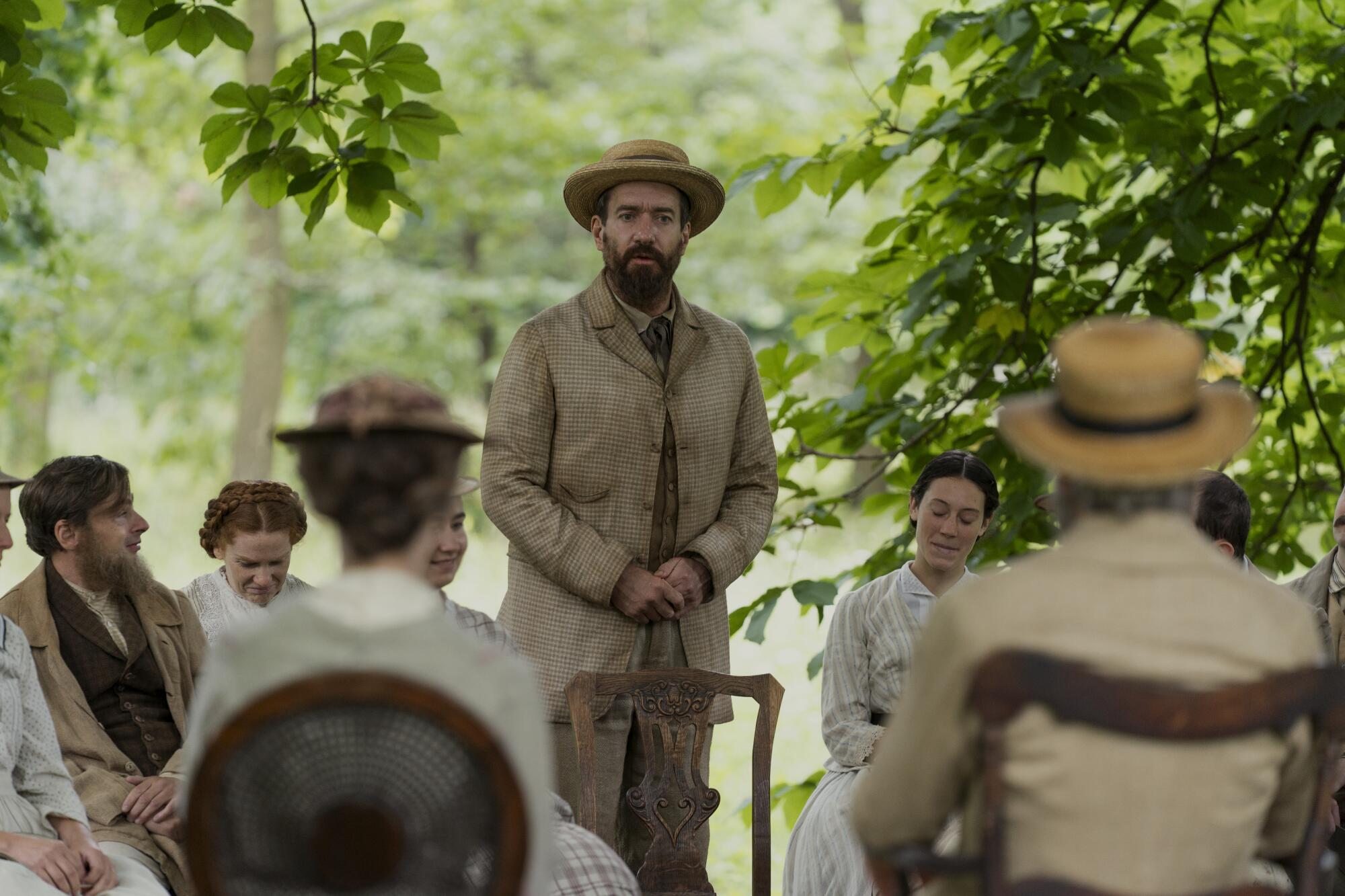
Charles Guiteau (Matthew Macfadyen) was part of the Oneida community, which practiced communalism and free love, but he wasn’t accepted by its members.
(Larry Horricks/Netflix)
Ross describes Macfadyen as someone who’s empathetic, warm and funny. “I wanted that humanity because the real Guiteau was a deeply disturbed man who was psychologically brutalized by his father to the point he was a non-functioning person.”
Makowsky says as he was reading Millard’s book, he thought of Rupert Pupkin, Robert De Niro’s deranged-fan protagonist in Scorsese’s “King of Comedy.” “This guy showing up, day in and day out, hoping for an audience with his hero [Garfield], being continually rebuffed to the point where something in his brain breaks,” he says of Guiteau. “He felt like a direct historical antecedent to the Rupert Pupkins and Travis Bickles of the world. He fell through the cracks and we lost potentially one of our greatest presidents because of it.”
Makowsky recalls shooting the only dialogue scene between Garfield and Guiteau, when the “greatest fan” finally gets to meet his idol. To Makowsky’s surprise, Macfadyen’s Guiteau “just burst into tears. That wasn’t scripted. It was so overwhelming to him. I think in that moment, more than any other in the series, you feel something for this man.”
Party (hearty) over country
Garfield was succeeded in office by Chester A. Arthur, whom Makowsky calls one of the least likely persons to ever become president. “The man had never held elected office,” he says. “His one political appointment prior to his nomination for vice president was as chief crony of the spoils system of [New York Sen.] Roscoe Conkling’s political machine. The level of corruption was so audacious and insane.”
He’s played with oft-drunken brio by Nick Offerman, whose voice Makowsky says he heard in his head as soon as he started writing the role: “I was like, it has to be Nick Offerman.” He took some liberties with the character and events, including a memorable sequence where Arthur and Guiteau go on a bender. Makowsky says they “probably never had a wild night out in New York, but it was an indelible proposition and I couldn’t resist.”
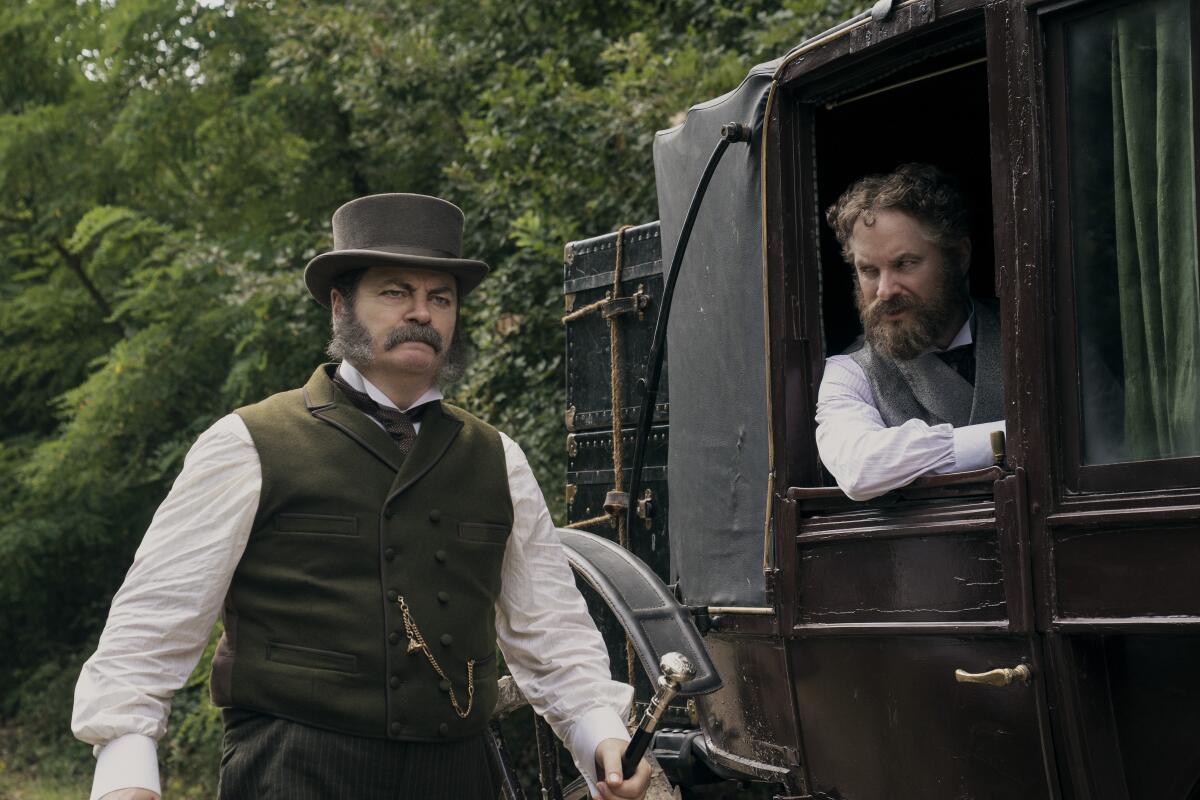
Nick Offerman plays eventual President Chester A. Arthur, who was closely aligned with New York Sen. Roscoe Conkling (Shea Whigham).
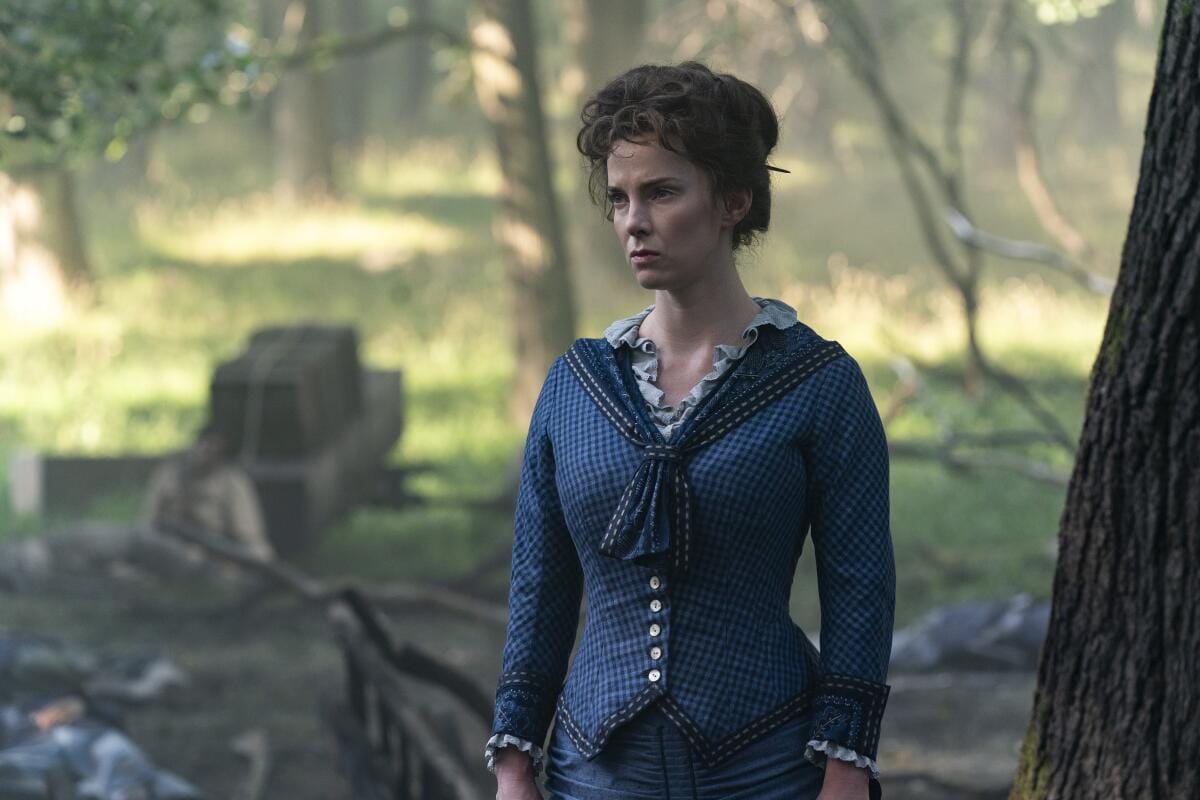
Betty Gilpin portrays First Lady Lucretia Garfield as her husband’s intellectual equal. (Larry Horricks / Netflix)
As to the first lady, “Lucretia Garfield was every bit her husband’s intellectual equal. But she couldn’t vote. There was a ceiling to what a woman in her day could accomplish,” Makowsky says, wistfully musing on what she might have achieved, given the chance. “And Betty [Gilpin] radiates that strength and that acute intelligence.”
Having recently given birth, Gilpin took her family along to Budapest for filming, voraciously researching Lucretia and reading her entire correspondence with her husband. The role gets meatier as the series progresses until she initiates an unforgettable, blistering encounter with Guiteau to button the story.
“Betty jokingly said to me, ‘If you cut that scene, I will kill you.’ I was like, ‘There’s no way that scene is being cut. It’s one of my favorite scenes in the entire show,’” Ross recalls. “Everyone who read it was like, ‘Oh my God, this scene.’ And Betty just knocked it out of the park, take after take after take.”
The forgotten president
Ross says when he first read Makowsky’s scripts, he thought they were “fantastically relevant” and offered a fresh look at American history. “As an American, I’m always trying to figure out what it means to be American,” he says. “The story of Garfield, you couldn’t make it up. He was a hero of working people and the promise of American democracy — having a representational democracy where those in power and the wealthy are not controlling the laws of the land, which could not be more relevant today.”
Makowsky calls Garfield “a poster boy for the American dream,” rising from poverty to the nation’s top office.
“He was a war hero and a Renaissance man that did math theorems while he was in Congress and who could recite Homer from memory,” he says. “This remarkable individual, fiercely intelligent and a brilliant, powerful orator, was far ahead of his time on certain political questions of the day. He was an outspoken proponent for civil rights and universal education and civil service reform.”
In real life, and as depicted in the series, Garfield worked with notable Black leaders like Frederick Douglass and Blanche Bruce, the first Black register of the Treasury, whom he appointed.
“The great tragedy is we were robbed of a potentially generational leader in Garfield,” Makowsky says.
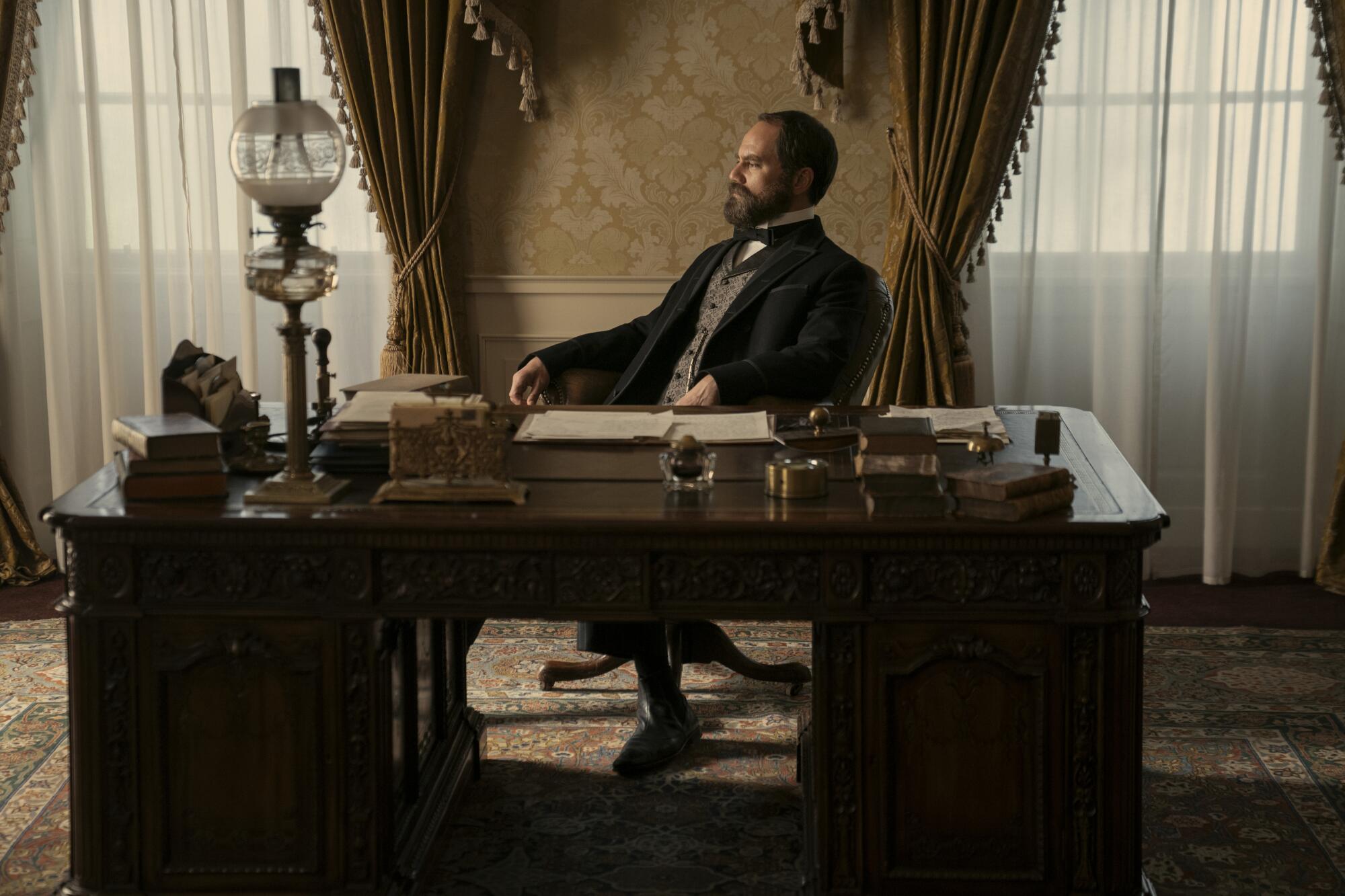
“Death by Lightning” showrunner Mike Makowsky says Americans were robbed of a “potentially generational leader” in James Garfield.
(Larry Horricks / Netflix)
Garfield wasn’t even seeking the nomination when he spoke on behalf of another candidate at the Republican National Convention of 1880, but his speech so moved the delegates that they eventually persuaded him to accept the nomination after more than 30 votes failed to produce another winner. It reminded Makowsky of then-Sen. Barack Obama’s 2004 speech at the Democratic National Convention, where he presented “a strong and confident, optimistic vision for the future of our country.”
Nowadays, such a rise seems less likely. “I don’t know if that would happen today, obviously because of money in politics; no one can run if they don’t have phenomenal backing,” Ross says.
Ross emphasizes the show is “not a history lesson,” drawing a distinction between drama and documentary. At times, “Death by Lightning” plays like a black comedy. Makowsky’s dialogue, while usually honoring what we think of as the formality and vocabulary of the 1880s’ idiom, occasionally veers into hilariously cathartic invective that bracingly reminds us these were living, breathing people with fire in their bellies.
“Ken Burns could make a 10-hour documentary to encapsulate all the nuances of this incredible story,” says Ross. What Makowsky did, Ross says, was contextualize the history through the prism of two very different people, Garfield and Guiteau.
“One is this incredibly admirable American figure I think everyone should know about, the greatest president we never really had. And then the other is a charlatan, a deeply broken, deeply mentally ill man who just kind of wanted to be Instagram-famous, just wanted to be known. You see this moment in history through their eyes, and I thought that was delicious.”
